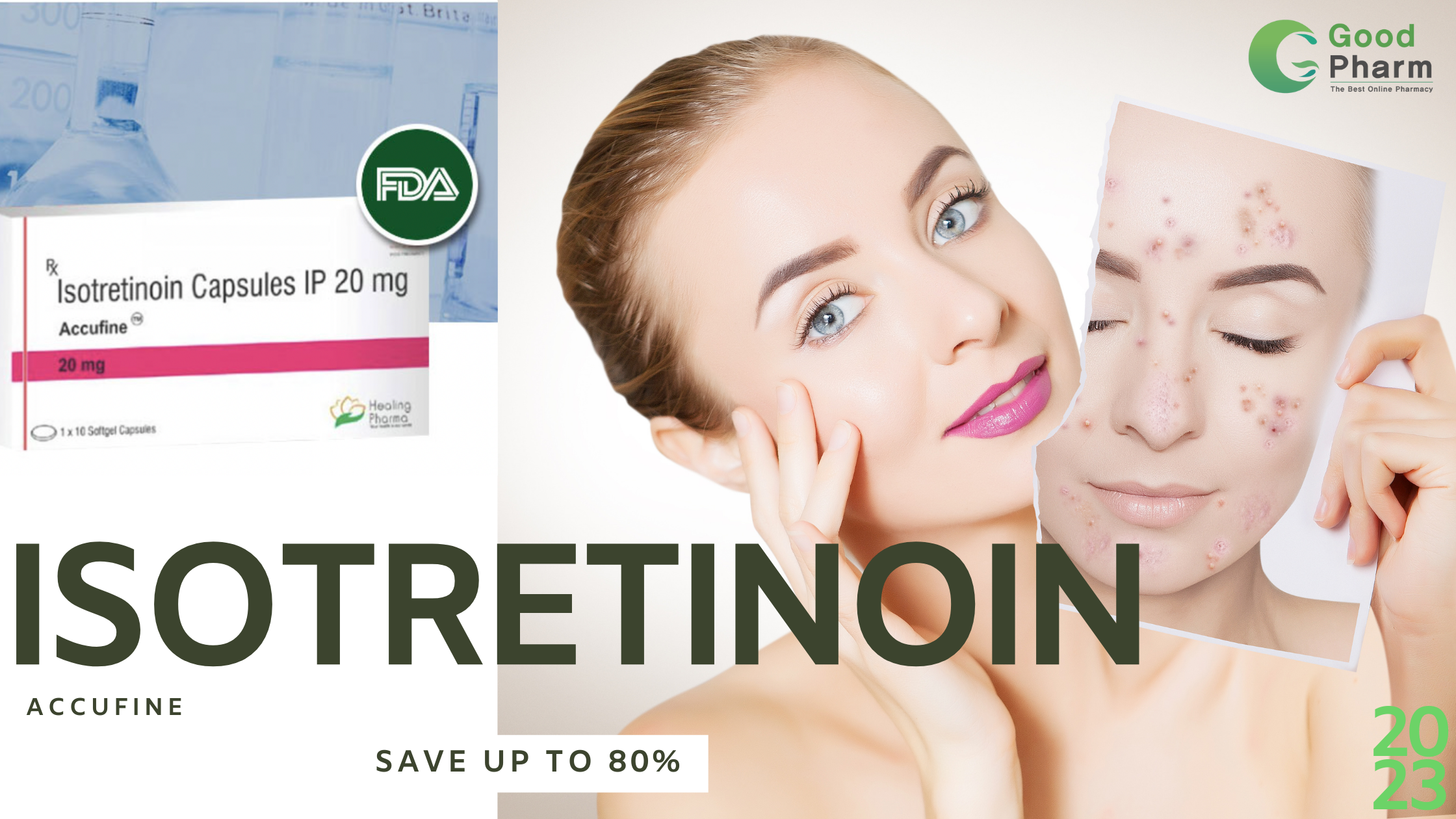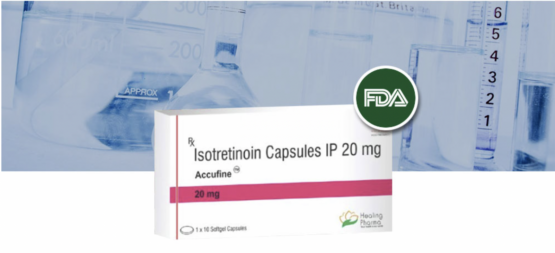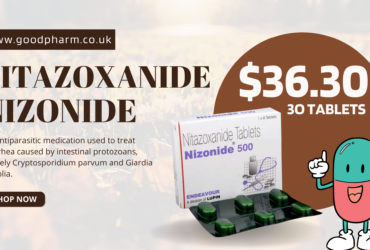- Your cart is empty
- Continue Shopping
Experience the Healing with Isotretinoin (Accufine) – The best medicine for Acne

It is a generic brand name of its active ingredient, Isotretinoin. This drug was approved by the US Food and Drug administration (FDA) in 1982 as an oral prescriptionmedication to treat severe, resistant, nodular acne that is unresponsive to conventional treatment, including systemic antibiotics.
Isotretinoin (Accufine) contains an active ingredient, Isotretinoin. It is an orally administered drug which belongs to a class of drugs known as retinoids, which is a derivative of vitamin A.
Good Pharm provides one of the cheapest Isotretinoin (Accufine) in the market that is high quality and FDA Approved manufactured in India.
How does Isotretinoin (Accufine) work?
The exact mechanism of action of Isotretinoin is unknown. According to studies, Isotretinoin inhibits sebaceous gland function and keratinization at pharmacologic doses. This drug has been observed to reduce both the sebaceous gland size and sebum production, which are the major causes of severe acne.
Isotretinoin is the only available acne drug that affects all four major pathogenic processes in acne, which distinguishes it from alternative treatments (such as antibiotics, topical ointments) and accounts for its efficacy in severe, nodulo-cystic cases. The effect of Isotretinoin on sebum production can be temporary, or remission of the disease can be complete and prolonged.
How should Accufine 40mg be taken?
Oral Isotretinoin is best absorbed when taken with high fat meal, because it has a high level of lipophilicity. The efficacy of Isotretinoin doubles when taken after high fat meal compared to when taken without food. Isotretinoin should be taken with a full glass of water to avoid esophageal irritation.
Due to Isotretinoin’s molecular relationship to vitamin A, it should not be taken with vitamin A supplements due to the danger of toxicity through cumulative overdosing.
Isotretinoin comes as 10mg, 20mg, and 40mg soft capsules. The dose of Isotretinoin varies from person to person, and is usually taken once or twice a day depending on the severity of the condition. Always seek guidance from your doctor before you take this medicine.
Initial dosing of Isotretinoin is commonly at 0.5mg/kg/day and then gradually increased to a dose of 1.0 mg/kg/day according to patient tolerance. The doctor may change the dose from time to time. You may need a higher dose if your acne is not getting better, or you may need a lower dose if you are experiencing severe adverse effects. Always speak to your doctor if you think your dose is too high or too low.
Manufacturer Recommended Daily Dosage by Body Weight:
40kg (88 pounds) – 20mg (0.5 mg/kg); 40mg (1 mg/kg); 80mg (2 mg/kg*)
50kg (110 pounds) – 25mg (0.5 mg/kg); 50mg (1 mg/kg); 100mg (2 mg/kg*)
60kg (132 pounds) – 30mg (0.5 mg/kg); 60mg (1 mg/kg); 120mg (2 mg/kg*)
70kg (154 pounds) – 35mg (0.5 mg/kg); 70mg (1 mg/kg); 140mg (2 mg/kg*)
80kg (176 pounds) – 40mg (0.5 mg/kg); 80mg (1 mg/kg); 160mg (2 mg/kg*)
90kg (198 pounds) – 45mg (0.5 mg/kg); 90mg (1 mg/kg); 180mg (2 mg/kg*)
100kg (220 pounds) – 50mg (0.5 mg/kg); 100mg (1 mg/kg); 200mg (2 mg/kg*)
*See Dosage and Administration: the recommended dosage range is 0.5 to 1mg/kg/day
Typical therapy requires a 16-24-week course of daily Isotretinoin administration to achieve complete prolonged remission of the disease.
What if you miss a dose?
If you miss a dose of this medicine, take it as soon as possible. However, if it is almost time for your next dose, skip the missed dose and go back to your regular dosing schedule. Do not double the doses.
What if you take too much?
If you take too much of the drug, seek medical help immediately.
What are the side effects of Isotretinoin (Accufine)?
The most common adverse effects of Isotretinoin are:
- Cheilitis (Dry lips) – it is the most common dose-dependent adverse effect seen in about 90% of patients taking Isotretinoin.
- Xerosis (Dry skin), Xerostomia (Dry mouth), dry nose and sun sensitivity – sun protection and skin moisturizers and barriers are important for patient education before starting medications. Patient should also avoid all skin resurfacing procedures such as waxing, dermabrasion, laser therapy) during treatment and at least six months after treatment to prevent skin irritation and scarring.
- Hypertriglyceridemia and increased erythrocyte sedimentation rate are also very common side effects of Isotretinoin therapy – frequent laboratory monitoring is indicated during the induction period and throughout treatment with Isotretinoin to monitor these common adverse effects.
Other Potential Adverse Effects
- Itching, skin irritation, hair thinning, headache, vision changes, skin fragility, dry eyes, skin infections, rash, bone or joint pain, and muscle aches.
Serious skin reactions, including Stevens-Johnson Syndrome and Toxic Epidermal Necrolysis, have been reported and warrant prompt cessation of Isotretinoin if they occur during therapy.
There are also reports of Acute pancreatitis in patients taking Isotretinoin with both normal and elevated serum triglyceride levels. Therapy should be discontinued if symptoms of pancreatitis occur.
This is not a complete list of possible side effects. If you have any of these serious side effects or if you notice other effects not listed above, contact your doctor immediately.
What other precautions should be taken?
– Children: Safety and efficacy of this medication have not been established in this population.
– Elderly: It is safe to use in the geriatric population.
– Pregnancy: Due to the known teratogenicity of isotretinoin and inadequate pregnancy data for adapalene, its use during pregnancy cannot be recommended.
– Breastfeeding: Do not take isotretinoin capsules while you are breastfeeding
Other General Warnings
* Drug-disease interactions: There are 5 disease interactions with isotretinoin which include:
- Intracranial hypertension
- Psychiatric disorders
- Osteoporosis
- Elevated serum triglycerides
- Liver disease
To make sure it’s safe for you, inform your doctor if you have these following conditions:
All of the information above was based on research with a thorough examined by actual experts in the field of Pharmaceuticals.






